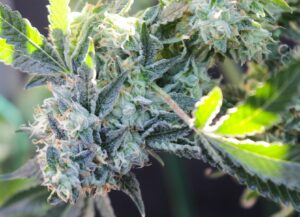“I’m a longtime user of weed. It helps me with mood issues like depression and anxiety, and keeps me on an even keel. I’m wondering about the connections with dopamine levels. Does smoking depress or increase how much dopamine you have in your system?”
Jonathan K.

A good question, with a complicated answer. Some studies show that “acute THC causes increased dopamine release and neuron activity, whilst long-term use is associated with blunting of the dopamine system.”
As you probably know, dopamine is a neurotransmitter. It’s a hormone that continuously circulates from neuron to neuron in different amounts, controlling a wide range of brain and bodily activities, including pleasure, movement, memory, attention, sleep, mood, and learning.
Think of it as a feelgood or reward hormone that we rely on each day for happiness, wellbeing, and motivation. If your dopamine levels are too low, you might get affected by depression, other mood disorders, and have problems with memory, concentration, and movement.
When levels are too high, dopamine can lead to compulsive or impulsive behavior, including aggression, addiction, and ADHD.
THC (tetrahydrocannabinol), the main psychoactive component in cannabis, has been shown in studies to induce “dopamine release in the human striatum,” a part of the brain associated with our reward and motivation response.
It may encourage this release in a roundabout way. The endocannabinoid system (ECS) has a close connection to the body’s dopamine signaling system. Marijuana fires CB1 receptors on GABA (a neurotransmitter acid that connects the brain and the nervous system) neurons. These GABA neurons usually work to suppress the effectiveness of dopamine.
So, cannabis temporarily suppresses GABA, and its dopamine-inhibiting influence, so dopamine production actually increases under the influence of THC. This might in turn boost your mood, increase your motivation, and bring other positive benefits.
High dopamine levels massage the brain’s reward system, causing feelings of pleasure, achievement, and satisfaction, and achievement. It may also slow down the perception of time as the mind speeds up, perhaps increasing sex drive, energy, and focus.
Cannabinoids can also act as neuroprotective agents, helping to protect brain cells. And this has implications for people with Parkinson’s disease, a debilitating degenerative disorder. If dopamine-producing cells don’t die, dopamine levels can stay where they need to and cell death won’t cause protein buildup and increased inflammation.
In short, Parkinson’s disease seems to happen when dopamine levels in the midbrain region begin to fall, affecting the person’s ability to move and speak. Cannabis’s positive effect on dopamine levels working through the ECS and as a neuroprotector has shown that both THC and CBD may have a role in the treatment of the disease.
That said, if dopamine levels stay too high, too long in your body, this may serve to shut off some of the dopamine receptors, taking away the pleasure you would normally feel with things in your life, such as eating food, enjoying the company of others, doing hobbies and activities, and so on.
Heavy marijuana use can sometimes have this effect, suppressing flow of dopamine and lowering your mood, motivation, and movement. It can also make you feel tired and throw a wrench into the workings of memory.
Long-term effects of heavy cannabis use included an increased risk of dopamine-related physical and mental health issues, such as schizophrenia, psychosis, anxiety, depression, and Parkinson’s disease.
So, as with many things in life, the successful use of cannabis to positively affect dopamine levels is in moderation. A healthy balance can give you the feelgood rewards that you are seeking.
Carolyn M.






